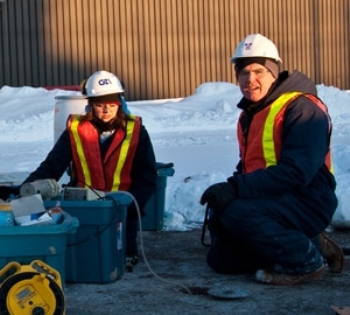According to Dr Denis O’Carroll, a visiting scholar at the University of New South Wales Water Research Lab, iron nanoparticles coated with a rust-preventing polymer show promise in cleaning up toxic chemicals from groundwater.

Dr Denis O'Carroll and colleagues at groundwater test site in Ontario, Canada
O’Carroll, the visiting academic from the University of Western Ontario in Canada, informed that conventional clean-up techniques either pump out the contaminated water or use a specially prepared cleansing solution to flush out toxins. However, these methods have their own drawbacks in identifying and accessing exact locations that are contaminated with toxins.
O’Carroll’s method involves nanotechnology to deal with toxic contaminants. He is working on developing a novel clean-up technology based on metal nanoparticles. The method involves the direct injection of iron nanoparticles into the contaminated soil where they activate a redox reaction when they come into contact with the contaminants.
The reaction transfers electrons between the pollutant and the nanoparticles, thus modifying the pollutant’s oxidation state and reducing its toxicity to safer levels, said O’Carroll. The nanoparticles’ smaller size enables them to travel via minuscule flow channels in soil to reach and obliterate pollutants. Moreover, iron nanoparticles’ low mobility and rapid solubility make them safer for environmental applications. However, these qualities also restrict the nanoparticles’ capability to detect and destroy toxins.
To overcome these drawbacks and enhance the nanoparticles, O’Carroll is working on various formations of iron. When these iron nanoparticles are encapsulated in a rust-preventing polymer, their mobility gets increased and dissolution process gets slow down without any harmful environmental effects. In field trials, this novel technology notably degraded contaminants in two contaminated locations in Ontario, said O’Carroll.
Disclaimer: The views expressed here are those of the author expressed in their private capacity and do not necessarily represent the views of AZoM.com Limited T/A AZoNetwork the owner and operator of this website. This disclaimer forms part of the Terms and conditions of use of this website.